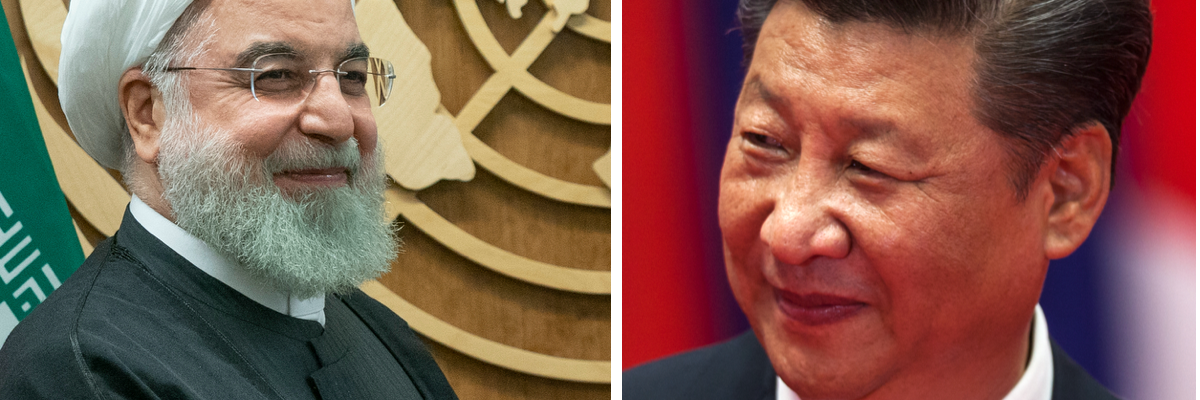The recent economic and security cooperation agreement signed by Iran and China will have far reaching consequences for geopolitics in the Middle East. For certain, U.S.-led effort to contain Iran regionally and strangle it financially surely pushed both countries in this direction.
The deal gives Tehran a vital, if fickle, partner to help withstand economic sanctions imposed since the Trump administration exited the nuclear deal in 2018. Iran’s economy has steadily contracted since then. Foreign direct investment has plummeted with Tehran having fewer takers of its oil —save for China, which has steadily increased its imports over the last year.
For Beijing, the deal marks an important hedge in its relationship with oil-producing Persian Gulf states, which are long-standing U.S. security partners. While the terms of the deal have yet to be released, it purports to provide a steady and stable flow of Iranian oil to China in return for much needed investments in Iran’s critical infrastructure — from ports to high-speed rail, to energy and petrochemicals. If geopolitical tensions between Beijing and Washington reach a boiling point whereby Arab states are pressured by the United States to choose sides, China can rest assured that Tehran will be a reliable partner.
From Iran’s perspective, the deal positions Tehran’s financial and strategic interests firmly in Asia. It has long been Iran’s wish to join the Shanghai Cooperation Organization — the Eurasian economic and security alliance led by China and Russia. Tehran’s SCO dream could soon become reality, as Iran features prominently in China’s ambitious Belt and Road initiative. Currently, Iran holds observer status. Conversely, the JCPOA’s failure to provide Tehran with the much-needed foreign investment and economic development that it was promised has now hobbled moderate and reformist Iranian officials who sought improved ties with the West to avoid geopolitical overreliance on China and Russia.
The political space for better relations between Washington and Tehran is currently more limited by domestic politics in both countries. While Iran’s preference has always been for European and American technology and investment, it will settle for Chinese instead — with less hassle. Beijing does not make demands on Iran’s domestic politics, regional policies, or missile program, as Brussels and Washington consistently do.
Furthermore China’s policies are not unduly influenced by its other strategic relationships in the Middle East-it acts independently of them. China prefers bilateral ties with autonomous actors that it feels can be reliable in the face of U.S. pressure. That suits Tehran just fine, so long as it can participate in a Yuan-based financial system that does not choke it off from economic development based on the whims of every new occupant of the White House.
Iran’s leadership is committed to absorbing whatever sanctions come their way, and they seem to be adjusting the Iranian economy accordingly. Some in Iran’s political establishment — particularly hardliners — welcome the pain that sanctions have brought onto the economy because it has forced Tehran to diversify away from energy exports, and instead prioritize domestic production and consumption. Their hope is that U.S. sanctions become less impactful over time, as Iran prioritizes both its internal economy and trading with countries that stand in opposition to the American-led financial system. A deal with China (and eventually Russia) would be a logical fulfillment of that hope.
There is some evidence that Tehran’s approach is working. At the turn of the century, oil accounted for 50 percent of Iran’s GDP. Today, it accounts for 15 percent. Proponents of the U.S. “maximum pressure” campaign would argue that the Iranian government is poorer as a result — having seen its economy contract over 15 percent since Donald Trump exited the nuclear deal, and sanctions dramatically reducing its oil exports. But “maximum pressure” has not made Iran curtail its regional posture, nor has it made the government cry uncle.
In fact, evidence suggests Iran’s economy is becoming more resilient: the IMF projects Iran’s economy to grow at 3.2 percent in 2021. In his recent Nowruz address to the nation, Supreme Leader Ali Khamenei primed the public for more sanctions in the future. Hardliners in Tehran and Washington want the same thing, but for different reasons.
Where does this leave Washington? Advocates of diplomacy hoped the Biden administration would quickly rejoin the nuclear deal, thereby creating the necessary political space in both capitals to discuss other issues of mutual concern. As Iran moves closer to China and Russia, that hope may fade. If hardliners take over the levers of power in Tehran after this summer’s presidential election, expect less of an appetite for such talks. Instead, Tehran will play the long game. It will join other Asian economies who have hitched their wagon to Chinese trade and development, warts, and all. If the West wants to deal with Iran, it could be facing a far more anti-Western negotiating partner than when the JCPOA was negotiated in 2015. Right now, President Hassan Rouhani and Foreign Minister Javad Zarif, are both viewed by the Iranian political establishment as reformers who seek accommodation and not confrontation with Washington.
If we are in a world of great power competition today, this can only be viewed as an own goal by Washington. Much like Asian countries who moved on to form their own trading bloc or join China’s after Washington exited the Transpacific Partnership, Tehran has decided to bet on a country that it believes will surpass the United States in economic and technological superiority. Time will tell if this was a good bet.
















